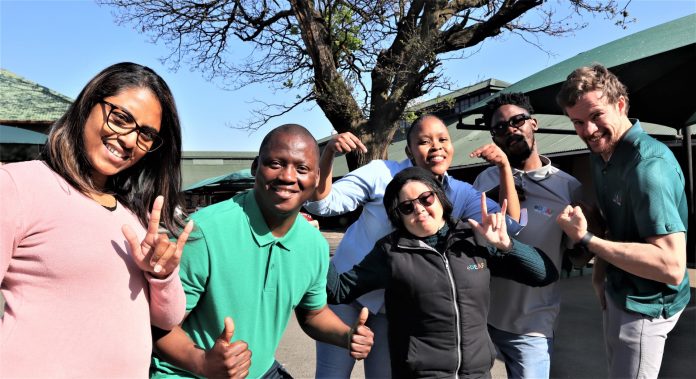In September, we celebrate Global Deaf Awareness month as well as International Week of Deaf people (19th-25th September 2022). In support of this year’s theme: “Building Inclusive Communities for All”, DEAFinition, a non-profit company that provide a range of services and funding opportunities to promote equal access for the Deaf community of South Africa, encourage both individuals and corporates to intentionally evaluate the way in which they communicate in order to ensure their messaging is inclusive to everyone, including the Deaf community.
Deaf people all over the world experience language deprivation and are being left out in so many areas of our society. The Covid-19 pandemic has highlighted the dire predicament Deaf people experience when trying to access life-saving health information and services.
“The next time you walk into a bank, police station or hospital, imagine what it might be like to be Deaf and imagine constantly being misunderstood or having to explain yourself over and over simply because the other person does not communicate in your language,” says Thembeka Gumede, DEAFinition Director.
Over 4 million South Africans have varying levels of hearing loss, and it is believed that close to 1.5 million persons communicate in South African Sign Language (SASL).
September is also heritage month in South Africa. A month in which we celebrate and recognise cultural diversity. This includes Deaf culture and Sign Language. “Being Deaf transcends gender, race and status. The Deaf people of South Africa have an incredibly rich culture which has the ability to bring together all cultures through a common signed language,” adds Gumede.
Earlier this year, President Ramaphosa’s Cabinet approved the Constitutional Eighteenth Amendment Bill for public comment in order to amend section 6 of the Constitution to provide for the recognition of South African Sign Language as South Africa’s twelfth official language.
“The amendment is a positive step towards realising the rights of persons with hearing loss to equal enjoyment of rights and human dignity. The Deaf community will finally have a voice and become an integral part of their own country and communities. It will promote inclusion, substantive equality and prevent unfair discrimination,” says Gumede.
Lance Schultz, CEO of Pan South African Language Board (PanSALB) echoes Gumede’s sentiments: “The announcement re-affirms the democratic right of Deaf persons to participate in a meaningful and substantive way in public life, in their own language.”
The following key points will transpire should SASL become an official language of South Africa:
South African Sign Language Charter Pledges
- There must be an understanding nationally of SASL as a language in its own right
– SASL must be respected as a language of choice to be used in all interactions and as a primary native language in its own right.
- There must be self-determination by Deaf people
– Deaf people have an inherent right to represent themselves in any aspect of their lives. They have the right to privacy and to expect and receive adequate advice and be consulted on an ongoing basis regarding their needs.
- There must be a promotion of learning and high quality teaching of SASL
– Learning, using and having access to SASL is recognised as a basic human right for all people.
- Multilingual Deaf education for Deaf children must be promoted and encouraged
– Multilingual education is a fundamental human right and the main driver of development. There must be recognition of SASL and cultural diversity at schools and across society.
- There must be guaranteed access to services and information in SASL
– The importance of removing barriers to enable the Deaf community to have equal access to information and services and to participate fully and lead independent lives in all aspects of life.
- Persons working with Deaf people must reach the minimum competency in SASL
– It is critical that all public servants who engage with the Deaf community meet the minimum standard of competency in SASL.
- Local Deaf communities must be consulted on a regular basis
– To ensure that services are appropriate for and responsive to local needs in order to promote accountability and transparency, participatory governance and coordinated partnerships.
- Professional SASL interpreting and translation services must be readily available
– Deaf interpreters and SASL interpreters must facilitate communication in a neutral manner that ensures equal access to information and participation.
Once SASL becomes an official language, it will be recognised by government in all its sectors and society at large.
“In line with our ethos of supporting inclusivity and accessibility for the Deaf community, we developed an easily accessible SASL App that is free to download via Google Play and The App Store,” says Gumede.
The goal of this App is to bridge the communication gap between the Deaf and the hearing by allowing people to simply search for a word on any mobile device that has the free App installed.
“We have also recently launched an affordable online course offering a basic introduction to SASL. The training is self-paced, allowing you to work through the content at your leisure. The link to the training is available for a month from date of purchase and on conclusion you are able to download a certificate of completion. This course is aimed at anyone who is interested in learning more about the Deaf community, their culture, and SASL signs to support everyday conversations,” adds Gumede.
To register for the South African Sign Language online training, contact [email protected]
“As our society evolves and with SASL soon to be recognised as the twelfth official language, we encourage people to learn South African Sign Language. Deaf people cannot learn to hear, but hearing people can learn to sign,” concludes Gumede.
For more information please visit: www.deafinition.co.za or contact Thembeka Gumede on [email protected] or 087 063 8920.






